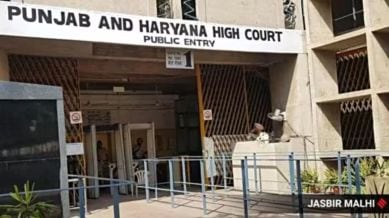Stay updated with the latest - Click here to follow us on Instagram
Acquitted 16 years ago, couple back in dock for fraud as HC overturns lower court ruling
Justice Jasjit Singh Bedi set aside a 2009 ruling by an additional sessions judge that acquitted the accused on technical grounds. The case will now return to the lower appellate court for a fresh hearing.

The Punjab and Haryana High Court has overturned the acquittal of two accused in a fraud case involving the illegal release of a truck on false surety bonds, reaffirming that an FIR is maintainable if forged documents are created outside the court and later submitted in judicial proceedings.
Justice Jasjit Singh Bedi set aside a 2009 ruling by the additional sessions judge in Kurukshetra and remanded the case for fresh adjudication, stating that the lower court had wrongly dismissed the charges on procedural grounds.
monthly limit of free stories.
with an Express account.
The case dates back to 2000, when an FIR was registered at Pehowa police station after a fatal accident involving a truck (PB-08E/8513). The vehicle, driven by Mangal Singh, allegedly caused the deaths of Kabal Singh and Love Preet Singh, while injuring Shamsher Singh. The truck was seized by the police.
Soon after, accused Mohan Singh fraudulently secured its release by impersonating a deceased man, Mohinder Singh, and submitting a forged affidavit in court. When the court later summoned Mohinder Singh, it was discovered that he had died in 1998—two years before the fraud took place. An investigation revealed that false sureties had been arranged using forged documents and misrepresentation.
In 2007, a Pehowa magistrate convicted Mohan Singh and Jaswinder Kaur under multiple sections of the Indian Penal Code, including 193 (false evidence), 209 (fraudulent claims in court), 419 (cheating by impersonation), 420 (cheating), 467 (forgery of valuable security), and 471 (using forged documents as genuine). They were sentenced to imprisonment ranging from two months to three years.
However, in 2009, the additional sessions judge acquitted them, ruling that the case was barred by Section 195 of the Code of Criminal Procedure, which requires a complaint from the court where the offence occurred. The judge held that an FIR could not have been registered independently.
During the hearing in the high court, advocate A S Virk represented the petitioner, while advocate Amandeep Singh Rai appeared as amicus curiae for the accused. Additional Advocate-General Ravish Kaushik represented the Haryana government.
Justice Bedi, while setting aside the acquittal, cited the Supreme Court’s ruling in Iqbal Singh Marwah vs. Meenakshi Marwah (2005), which distinguishes between forgery committed within the court’s custody (custodia legis) and forgery committed outside but later submitted in court. He observed, “When forged documents are prepared outside the court and then introduced in judicial proceedings, the bar under Section 195 CrPC does not apply. A private complaint or FIR is maintainable in such cases.”
The ruling reaffirmed the principle that individuals committing forgery outside judicial proceedings cannot escape prosecution on technical grounds.
The case will now return to the lower appellate court for a fresh hearing.